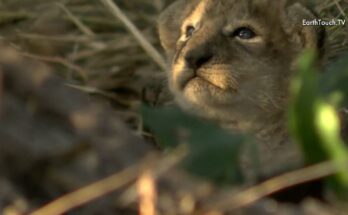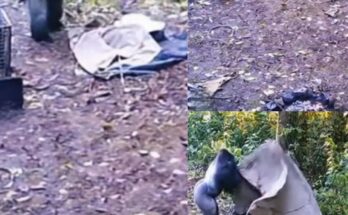
In the heart of the African savanna, under the shade of a baobab tree, the mighty lion king lay napping, his golden mane ruffling gently in the breeze. The midday sun beat down on the plains, and the pride was quiet—most of them lounging lazily, conserving energy. But one little lion cub had other plans.
Barely four months old, with oversized paws and endless curiosity, the cub had been pouncing on insects, chasing shadows, and practicing his roar—which, for now, sounded more like a squeaky yawn. As he romped around, he spotted the king himself—his father—dozing peacefully. With a mischievous glint in his eye, the cub decided it was the perfect moment for a game.
Bounding forward with uncoordinated enthusiasm, the cub leapt directly onto the king’s face, tiny claws catching in the thick mane. The king awoke with a startled grunt, eyes narrowing at the interruption. For a split second, the entire pride held its breath.
But instead of a roar, there was only a deep, rumbling sigh. The lion king lifted his massive paw and gently batted the cub to the side—not in anger, but with the patient tolerance only a father could show. The cub tumbled into the grass, let out a defiant squeak, then returned to his campaign of pouncing, nipping at the king’s tail.
Eventually, the cub nestled against his father’s side, finally worn out from play. The lion king rested his head back on his paws, eyes closing once again. Peace returned to the savanna, at least for a little while.
Even kings, it seems, must endure the relentless energy of youth—and in that quiet moment, under the African sun, the bond between father and cub spoke louder than any roar.


